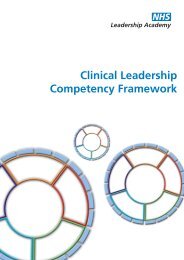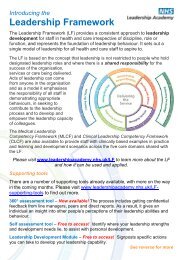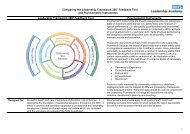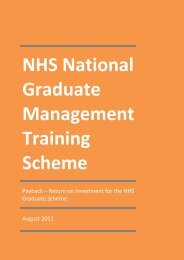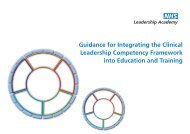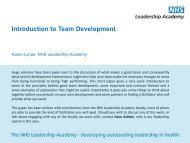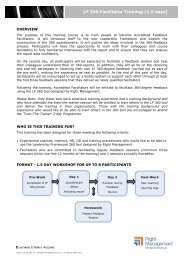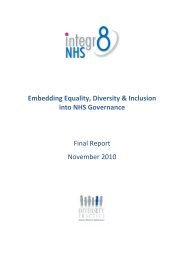Healthy NHS Board: a review of - NHS Leadership Academy
Healthy NHS Board: a review of - NHS Leadership Academy
Healthy NHS Board: a review of - NHS Leadership Academy
Create successful ePaper yourself
Turn your PDF publications into a flip-book with our unique Google optimized e-Paper software.
7.2 Size<br />
Recent guidance has not recommended any changes<br />
in the size <strong>of</strong> <strong>NHS</strong> provider boards. As in our original<br />
<strong>review</strong>, research-based recommendations on board<br />
size still vary (Bennington, 2010). There is limited<br />
evidence suggesting that smaller boards may be more<br />
effective. However, a <strong>review</strong> <strong>of</strong> the evidence on board<br />
performance indicates it is likely that the number <strong>of</strong><br />
directors on a board is rather less important than what<br />
directors do (Chambers et al., 2013).<br />
7.3 Composition<br />
Research evidence indicates that there may exist<br />
a connection between board composition and<br />
organisational strengths. However, a contingency<br />
perspective is emphasised: certain board compositions<br />
may better suit different challenges. For example, boards<br />
with a higher proportion <strong>of</strong> independent directors may<br />
support minimisation <strong>of</strong> risk in an organisation; smaller<br />
boards with more ‘insiders’ may support more innovation;<br />
while a larger proportion <strong>of</strong> ‘boundary spanners’ may<br />
support legitimisation <strong>of</strong> a new organisation with partner<br />
organisations (Chambers et al., 2013).<br />
Our original <strong>review</strong> noted the potential value to<br />
healthcare boards <strong>of</strong> ‘insider expertise’. This is reflected<br />
in the Francis Report’s support for a stronger nursing<br />
voice, for example recommending that boards obtain<br />
and record the Director <strong>of</strong> Nursing’s advice on how<br />
nursing staffing arrangements might impact on quality<br />
<strong>of</strong> care, and that boards should be encouraged to recruit<br />
nurses as Non-Executive Directors (Francis, 2013). In<br />
terms <strong>of</strong> research, a recent study indicates that a higher<br />
proportion <strong>of</strong> doctors (but not other clinicians) on<br />
boards is significantly associated with improved patient<br />
satisfaction and reduced mortality (Chambers et al.,<br />
2013, Veronesi et al., 2012). Also, research suggests that<br />
CEO characteristics may be important, with background<br />
as a doctor associated with better levels <strong>of</strong> quality in US<br />
hospitals (Goodall, 2011) and CEO tenure supporting<br />
prioritisation <strong>of</strong> patient safety in UK hospitals (McKee<br />
et al., 2010). The tendency to select doctors for a board<br />
role based on their clinical, rather than governance,<br />
expertise is noted (Bennington, 2010). Given doctors’<br />
potential contribution to board and organisational<br />
effectiveness, this suggests that induction and training is<br />
particularly important with this staff group.<br />
There is some research evidence on the benefits <strong>of</strong><br />
diversity. Reviews <strong>of</strong> the evidence indicate that greater<br />
gender and race diversity at board level is positively<br />
associated with greater innovation (Bennington, 2010).<br />
Research indicates that training in equality and diversity<br />
is associated with lower staff absenteeism (West et<br />
al., 2010). <strong>Board</strong>s may benefit from featuring more<br />
women. A recent study found that ‘high performing’<br />
healthcare organisations were more likely than ‘low<br />
performing’ organisations to have a board featuring at<br />
least 50% female membership (Chambers et al., 2011).<br />
Research suggests boards featuring a higher proportion<br />
<strong>of</strong> women may perform more effectively: identified<br />
benefits include better decision making, sensitivity to<br />
other perspectives, greater transparency, and higher<br />
quality governance processes (Alimo-Metcalfe, 2012,<br />
Chambers et al., 2013, Bennington, 2010).<br />
7.4 Skills<br />
As described in our original <strong>review</strong>, and reflected in<br />
previous sections <strong>of</strong> the current <strong>review</strong>, boards must<br />
draw together a wide range <strong>of</strong> skills to carry out their<br />
duties (National Quality <strong>Board</strong>, 2011, Storey et al.,<br />
2010a). Many <strong>of</strong> these relate to topics under discussion<br />
in board meetings, reflecting such priorities as finance,<br />
productivity and most importantly quality (Storey<br />
et al., 2010a, National <strong>Leadership</strong> Council, 2010).<br />
Wider skills to ensure effective working <strong>of</strong> the board<br />
include decision making, people management (based<br />
on emotional intelligence), and managing numerous<br />
complex issues simultaneously (Storey et al., 2010b,<br />
Deffenbaugh, 2012, Storey et al., 2010a).<br />
Corporate guidance recommends that Executive<br />
Directors consider taking on a non-executive role in<br />
another organisation: this may help ensure they possess<br />
a suitably wide range <strong>of</strong> board governance skills, and<br />
contribute to board dynamics by providing them with<br />
a clearer appreciation <strong>of</strong> the contributions and needs<br />
<strong>of</strong> their current non-executive colleagues (Financial<br />
Reporting Council, 2011).<br />
32 The <strong>Healthy</strong> <strong>NHS</strong> <strong>Board</strong>, 2013: Principles for Good Governance



